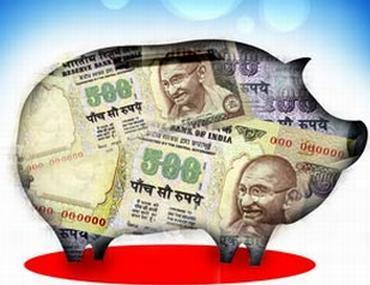
Interest rates on bank FDs have started coming down and rates on other fixed-income products will also decline.
Investors should lock into instruments offering higher returns, reports Sanjay Kumar Singh.
Illustration: Uttam Ghosh/Rediff.com
Being flush with liquidity and having limited avenues to deploy their funds, banks have begun to cut deposit rates.
The State Bank of India, ICICI Bank and HDFC Bank, among others, have reduced fixed deposit rates by 15 to 25 basis points (bps) for retail (small) deposits.
For bulk deposits (Rs 1 crore and above), SBI cut rates by 125 to 190 bps (100 basis points = one per cent) last week.
With large deposits coming due to demonetisation, bank deposit rates are likely to remain subdued.
Investors who have relied primarily on these need to diversify their fixed-income basket, so that their portfolio return doesn't take a hit.
Consider debt mutual funds
One option investors should consider is debt mutual funds.
While they don't offer assured returns, their returns are likely to beat those of bank FDs.
A few debt fund categories in increasing order of risk are: Liquid, ultra-short-term, short-term, income and dynamic bond funds.
"Choose a category based on your investment horizon," says Arnav Pandya, a financial planner. Your investment horizon should at least match the fund category's average maturity.
He suggests that if you want to invest for a month, go for a liquid fund; for one-three months, opt for an ultra-short-term fund; for at least one year, go for a short-term fund; if you have three years or more to spare, invest in an income fund.
While the first three categories are relatively safe, income funds and other longer-duration funds carry duration risk.
Investment advisors are advising their clients to bet on longer-duration funds.
"With interest rates set to fall, investors should invest in debt funds having higher average maturity," says Tarun Birani, founder and chief executive officer, TBNG Capital Advisors.
This is a valid strategy, but only for investors with the requisite risk appetite.
Says Anil Rego, CEO, Right Horizons: "Income funds will perform well as long as rates are falling, say, over the next one year. After that, if rates begin to rise, they could give negative returns."
Either you should know when to exit these funds or have an advisor who can advise you on this. One way to reduce the risk in income funds is to have an investment horizon of three years or more. Also, limit your exposure to them.
An alternative is to bet on dynamic bond funds.
"These funds allow the fund manager to play across the interest rate curve. This gives investors the prospects of earning reasonably stable returns over time," says Killol Pandya, head-fixed income, Peerless Mutual Fund.
In these funds, the fund manager can change the fund's average maturity based on his view of where interest rates are headed.
The risk, as Arnav Pandya points out, is that too much is left at the fund manager's discretion.
"We may expect the fund manager to make the right calls based on his interest rate view, but what if he goes wrong?" he says.
In the case of shorter-term funds, choose a fund based on convenience (ease of investing), since the difference in returns between funds may not be high.
In the case of income or duration funds, Birani suggests looking for a fund that has a consistent track record over seven-10 years.
Check the fund manager's level of experience (at least seven years), the number of years for which he has been handling the fund (minimum three years), and its performance under him.
Part of the investor's money should also go into accrual funds.
These funds avoid taking duration risk and depend more on the interest paid by the bonds in their portfolios.
Here, avoid funds that have invested in low-grade papers.
Fixed Maturity Plans (FMPs)
These are another popular alternative.
"FMPs can give you returns 50 to 100 basis points higher than bank FDs of a similar tenure," says Rego.
Since an investor holds these funds till maturity, he can avoid interest-rate related volatility. However, they have a couple of disadvantages.
When you have surplus money, an FMP should be available whose tenure matches your investment horizon.
Also, you don't know how risky the FMP will be, since there is no portfolio that you can evaluate prior to investing.
Post Office Schemes
Interest rates on some post office schemes remain attractive.
The tax-fee rate of return on Public Provident Fund is still good.
Senior Citizen Savings Scheme and Sukanya Samriddhi Yojana also offer attractive rates.
Remember that the rates offered by Post Office Monthly Income Schemes (POMIS), Senior Citizen Savings Scheme and National Savings Certificate can be locked into for the tenure of these schemes, while those on PPF and Sukanya Samriddhi Yojana will keep getting revised.
Non-convertible debentures
Look for NCDs offering attractive rates of return. Before investing, take a look at the company's financials (whether it is growing) and its balance sheet (avoid heavily indebted players).
Avoid papers that are rated lower than Double-A.
Don't invest in NCDs with a tenure beyond two-three years.
"If the company's prospects deteriorate, you will get stuck in a longer-tenure paper," says Pandya.
Tax-free bonds
These usually hit the markets in the last three or four months of the year. They are well suited for investors in a higher tax bracket.
However, they have a long tenure of 10 to 20 years.
Lock into these only if they offer above 7% return.
Buy from the secondary market if your advisor or you can correctly calculate their yield to maturity (the return you will earn by holding till maturity).
For wealthy investors wanting large quantities, liquidity can be an issue in the secondary market, but bonds of up to Rs 10 lakh to Rs 15 lakh can be bought and sold without trouble.












 © 2025
© 2025